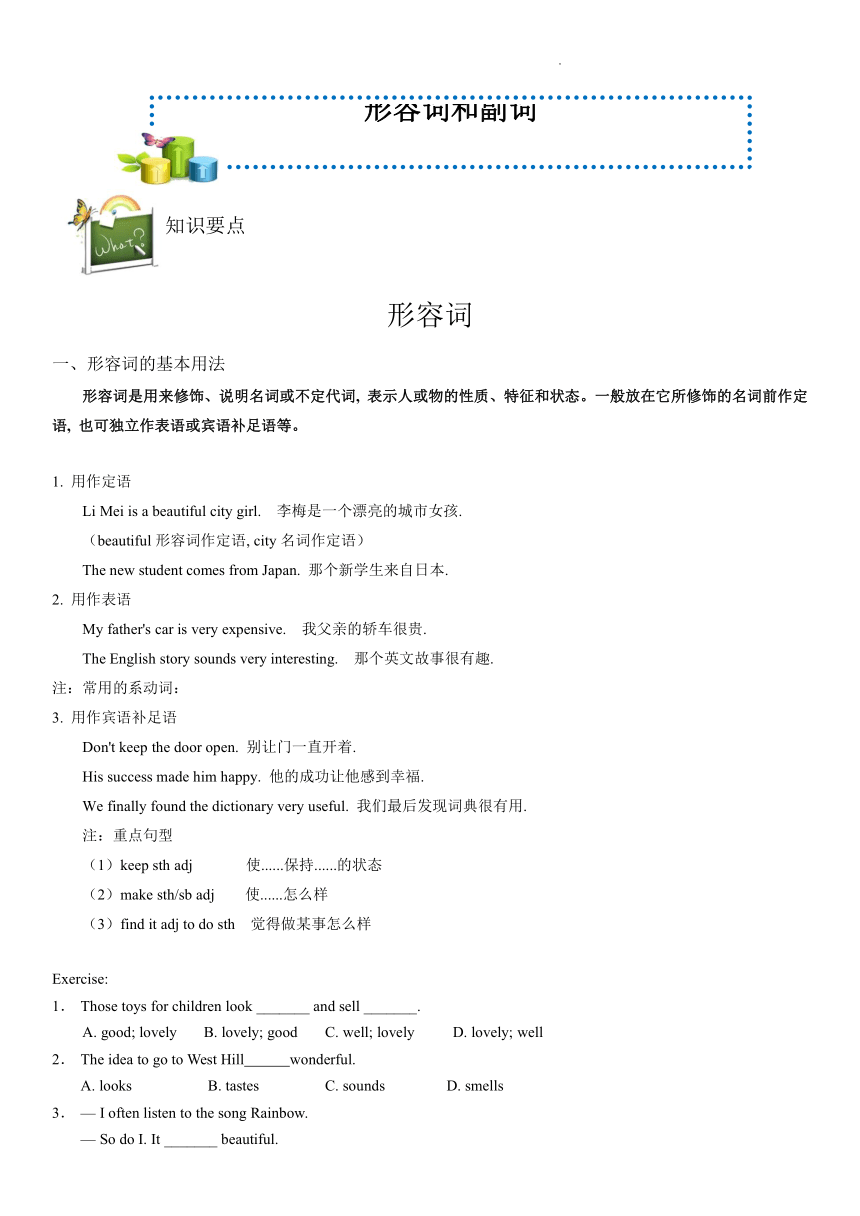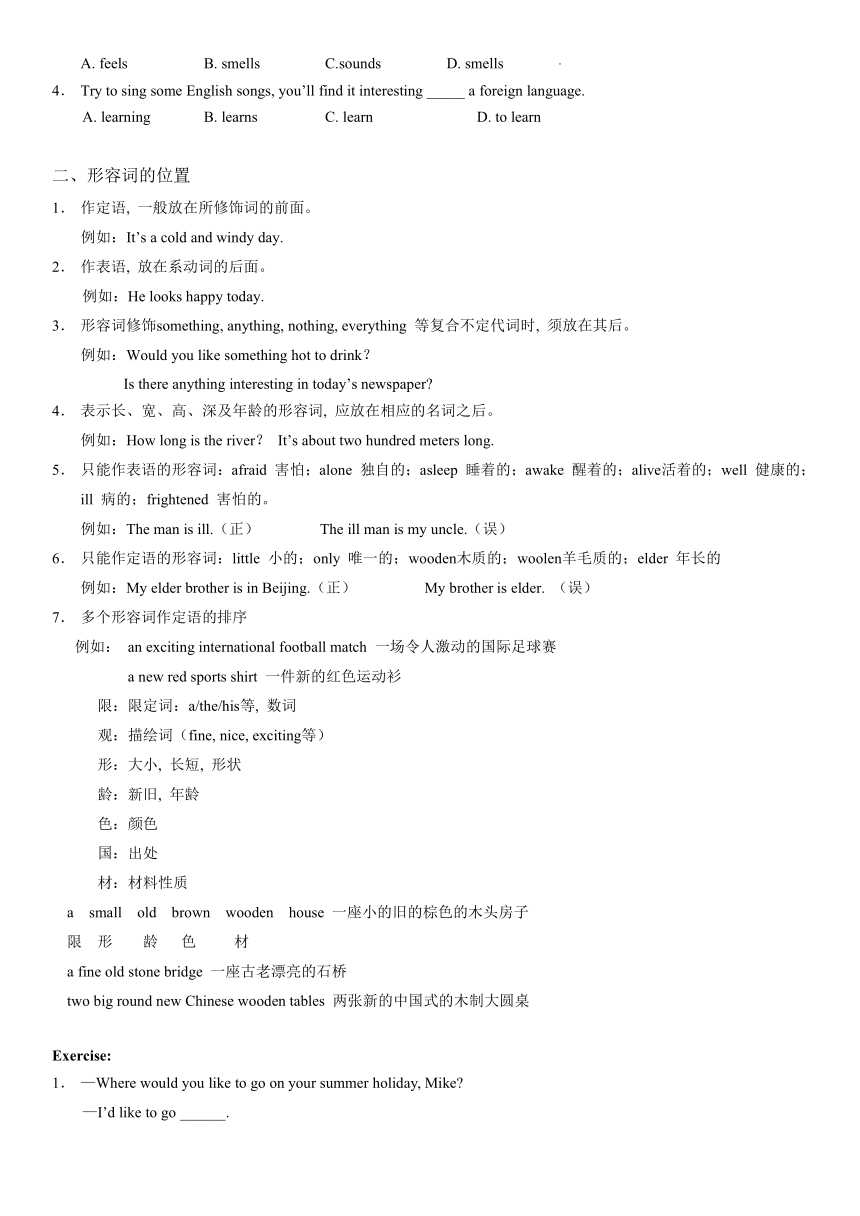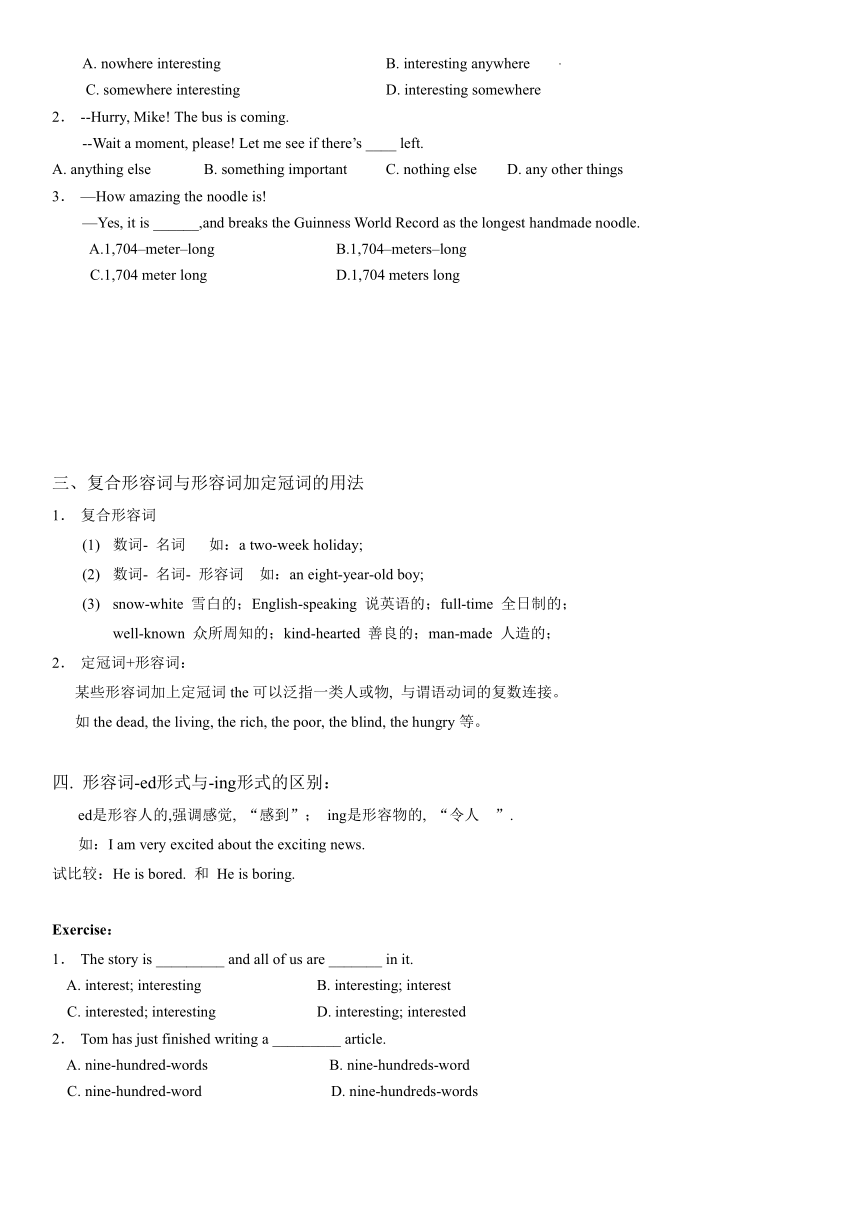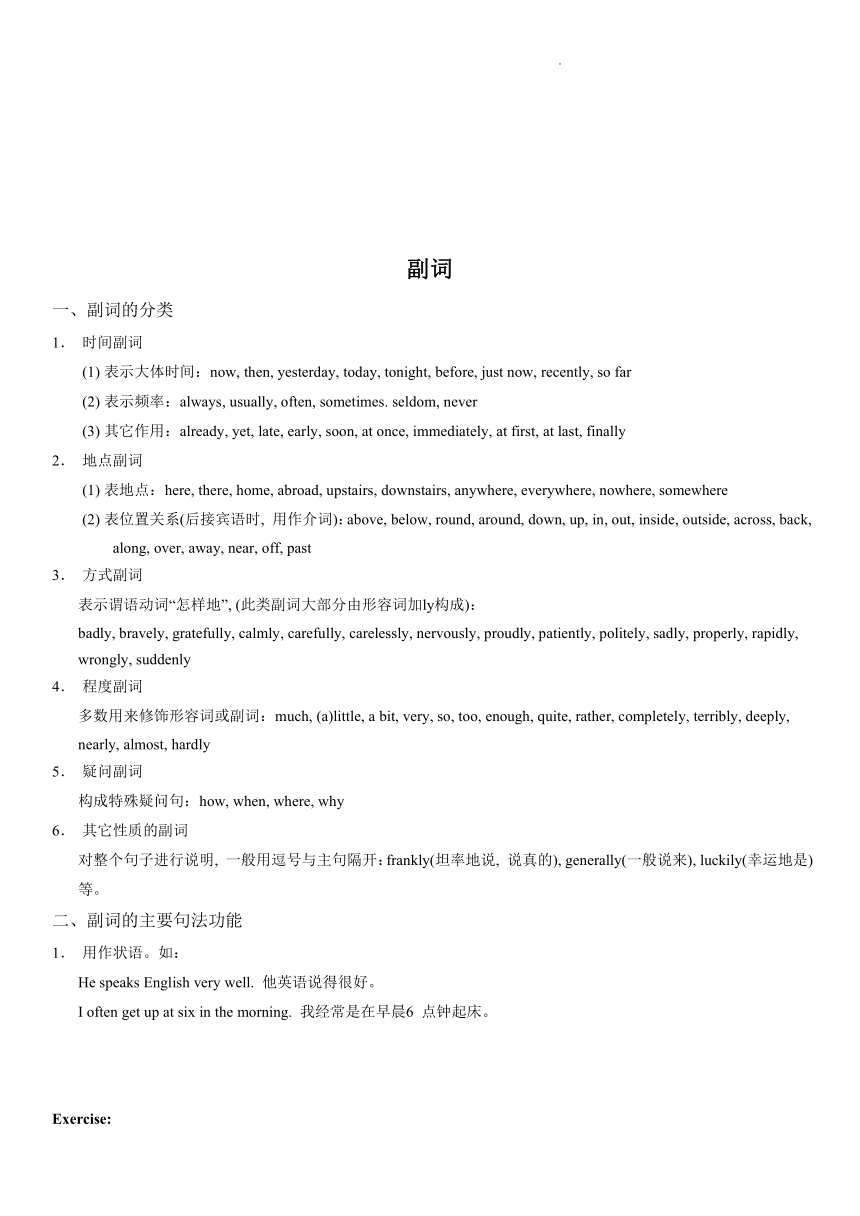2022年中考英语语法讲义(形容词和副词)(无答案)
文档属性
| 名称 | 2022年中考英语语法讲义(形容词和副词)(无答案) |  | |
| 格式 | docx | ||
| 文件大小 | 170.6KB | ||
| 资源类型 | 教案 | ||
| 版本资源 | 通用版 | ||
| 科目 | 英语 | ||
| 更新时间 | 2022-05-11 15:34:11 | ||
图片预览




文档简介
形容词
一、形容词的基本用法
形容词是用来修饰、说明名词或不定代词, 表示人或物的性质、特征和状态。一般放在它所修饰的名词前作定语, 也可独立作表语或宾语补足语等。
1. 用作定语
Li Mei is a beautiful city girl. 李梅是一个漂亮的城市女孩.
(beautiful形容词作定语, city名词作定语)
The new student comes from Japan. 那个新学生来自日本.
2. 用作表语
My father's car is very expensive. 我父亲的轿车很贵.
The English story sounds very interesting. 那个英文故事很有趣.
注:常用的系动词:
3. 用作宾语补足语
Don't keep the door open. 别让门一直开着.
His success made him happy. 他的成功让他感到幸福.
We finally found the dictionary very useful. 我们最后发现词典很有用.
注:重点句型
(1)keep sth adj 使......保持......的状态
(2)make sth/sb adj 使......怎么样
(3)find it adj to do sth 觉得做某事怎么样
Exercise:
Those toys for children look _______ and sell _______.
A. good; lovely B. lovely; good C. well; lovely D. lovely; well
The idea to go to West Hill wonderful.
A. looks B. tastes C. sounds D. smells
— I often listen to the song Rainbow.
— So do I. It _______ beautiful.
A. feels B. smells C.sounds D. smells
Try to sing some English songs, you’ll find it interesting _____ a foreign language.
A. learning B. learns C. learn D. to learn
二、形容词的位置
作定语, 一般放在所修饰词的前面。
例如:It’s a cold and windy day.
作表语, 放在系动词的后面。
例如:He looks happy today.
形容词修饰something, anything, nothing, everything 等复合不定代词时, 须放在其后。
例如:Would you like something hot to drink?
Is there anything interesting in today’s newspaper
表示长、宽、高、深及年龄的形容词, 应放在相应的名词之后。
例如:How long is the river? It’s about two hundred meters long.
只能作表语的形容词:afraid 害怕;alone 独自的;asleep 睡着的;awake 醒着的;alive活着的;well 健康的;ill 病的;frightened 害怕的。
例如:The man is ill.(正) The ill man is my uncle.(误)
只能作定语的形容词:little 小的;only 唯一的;wooden木质的;woolen羊毛质的;elder 年长的
例如:My elder brother is in Beijing.(正) My brother is elder. (误)
多个形容词作定语的排序
例如: an exciting international football match 一场令人激动的国际足球赛
a new red sports shirt 一件新的红色运动衫
限:限定词:a/the/his等, 数词
观:描绘词(fine, nice, exciting等)
形:大小, 长短, 形状
龄:新旧, 年龄
色:颜色
国:出处
材:材料性质
a small old brown wooden house 一座小的旧的棕色的木头房子
限 形 龄 色 材
a fine old stone bridge 一座古老漂亮的石桥
two big round new Chinese wooden tables 两张新的中国式的木制大圆桌
Exercise:
—Where would you like to go on your summer holiday, Mike
—I’d like to go ______.
A. nowhere interesting B. interesting anywhere
C. somewhere interesting D. interesting somewhere
--Hurry, Mike! The bus is coming.
--Wait a moment, please! Let me see if there’s ____ left.
A. anything else B. something important C. nothing else D. any other things
—How amazing the noodle is!
—Yes, it is ______,and breaks the Guinness World Record as the longest handmade noodle.
A.1,704–meter–long B.1,704–meters–long
C.1,704 meter long D.1,704 meters long
三、复合形容词与形容词加定冠词的用法
复合形容词
数词- 名词 如:a two-week holiday;
数词- 名词- 形容词 如:an eight-year-old boy;
snow-white 雪白的;English-speaking 说英语的;full-time 全日制的;
well-known 众所周知的;kind-hearted 善良的;man-made 人造的;
定冠词+形容词:
某些形容词加上定冠词the可以泛指一类人或物, 与谓语动词的复数连接。
如the dead, the living, the rich, the poor, the blind, the hungry等。
四. 形容词-ed形式与-ing形式的区别:
ed是形容人的,强调感觉, “感到”; ing是形容物的, “令人 ”.
如:I am very excited about the exciting news.
试比较:He is bored. 和 He is boring.
Exercise:
The story is _________ and all of us are _______ in it.
A. interest; interesting B. interesting; interest
C. interested; interesting D. interesting; interested
Tom has just finished writing a _________ article.
A. nine-hundred-words B. nine-hundreds-word
C. nine-hundred-word D. nine-hundreds-words
副词
一、副词的分类
时间副词
表示大体时间:now, then, yesterday, today, tonight, before, just now, recently, so far
表示频率:always, usually, often, sometimes. seldom, never
其它作用:already, yet, late, early, soon, at once, immediately, at first, at last, finally
地点副词
表地点:here, there, home, abroad, upstairs, downstairs, anywhere, everywhere, nowhere, somewhere
表位置关系(后接宾语时, 用作介词):above, below, round, around, down, up, in, out, inside, outside, across, back, along, over, away, near, off, past
方式副词
表示谓语动词“怎样地”, (此类副词大部分由形容词加ly构成):
badly, bravely, gratefully, calmly, carefully, carelessly, nervously, proudly, patiently, politely, sadly, properly, rapidly, wrongly, suddenly
程度副词
多数用来修饰形容词或副词:much, (a)little, a bit, very, so, too, enough, quite, rather, completely, terribly, deeply, nearly, almost, hardly
疑问副词
构成特殊疑问句:how, when, where, why
其它性质的副词
对整个句子进行说明, 一般用逗号与主句隔开:frankly(坦率地说, 说真的), generally(一般说来), luckily(幸运地是)等。
二、副词的主要句法功能
用作状语。如:
He speaks English very well. 他英语说得很好。
I often get up at six in the morning. 我经常是在早晨6 点钟起床。
Exercise:
The woman is very busy so she ________ watches TV.
A. often B. always C. seldom D. almost
Mrs Smith has a cute baby. It often smiles at people ________.
A. friendly B. lovely C. happily D. lively
—Emily, here's a dictionary. I hope it will help you.
—Thank you. It's ______what I need.
A. just B. still C. only D. almost
Elephants eat________, but they can move _______when necessary.
A. noisy; silent B. noisily; silently C. noisily; silence D. noisy; silence
三、副词的位置
一般副词通常位于所修饰动词之后, 频率副词或其它副词在句中时在实意动词之前, be动词、助动词、情态动词之后。
The girl dances very well. 这个女孩跳舞跳得好。
He does his work very carefully. 他做工作非常仔细。
We have already read the book. 我们都已读过这本书。
He never reads such books. 他从不看那样的书。
频度副词always 和never 通常不位于句首, 除非是祈使句:
Always remember this. 请时刻记住这一点。
Never tell him the news. 千万不要告诉他这消息。
修饰形容词副词时, 放在它所修饰词的前面。
He studies much harder now. 现在他学习努力多了。
He runs fast enough. 他跑的够快的。
enough 的用法
修饰名词 enough放前, 后均可, 通常放前:比如 enough money ,enough time
修饰形容词副词, enough放后面:比如:good enough happy enough
Exercise:
I can________ be a nurse. I’m not a very patient person.
A. seldom B. ever C. never D. always
--Don’t worry. My mother will look after your baby __________.
--Thanks a lot.
A. careful enough B. enough careful C.carefully enough D. enough carefully
---Bob is ________ late for school.
---Me neither.
A. always B. almost C. ever D. never
Speak aloud, please! I can _____ hear you.
A. almost B. hardly C. usually D. often
形容词变副词的规律
1. 通常情况下在词尾加ly: careful—carefully slow—slowly
2. 如果以辅音字母加y结尾的(除ly外), 去y加ily: heavy—heavily
3. 如果以e结尾的, 去e加ly: true—truly
4. 形容词, 副词形式相同的: hard, fast, early, late等
5. 不规则的变化:good—well
貌似副词的形容词:lonely 独自的;friendly 友好的;lively 生动的;lovely 可爱的
Exercise:
His grandparents live ____ in a small house, but they don’t feel _______.
A. lonely; alone B. alone; lonely C. lonely; lonely D. alone; alone
Some Chinese singers sing English songs just as ______ as native speakers do.
A. good B. better C. well
He said he would come to see us the next afternoon.
A. sometime B. some time C. sometimes D. some times
The students from Xinjiang enjoy staying in our school because everyone is _____ to them.
A friendly B gently C happily D politely
It is terrible. It`s raining so _________ that we can ________ go out..
A hard; hardly B hard; hard C hardly; hard
The new kind of car is _____ dear, I don’t have _____ money.
A. too much; much too B. much too; too much
C. too much; too much D. much too; much too
一、 单项选择
He was late this morning, because the bus was too ________ for him to get on.
A. quiet B. tidy C. crowded D. noisy
My cousin wants to keep slim. She does exercise every morning and ______ eats meat.
A. seldom B. always C. usually D. often
They young man is _______ carry that heavy bag.
strong enough to B. enough strong to C. not strong enough D. strong enough
Pass my glasses to me, Jack. I can _______ read the words in the newspapers.
A. hardly B. really C. rather D. clearly
It’s twelve o’clock at night, but he is _______ working.
A. already B. ever C. still D. yet
-- _______ will Jim be back --In five minutes.
A. How long B. How often C. How soon D. How about
Allen had to call a taxi because the box was _______ to carry all the way home.
A. much too heavy B. too much heavy
C. heavy too much D. too heavy much
She is _________ she can not reach the top of the blackboard.
A. such a tall person that B. much shorter than
C. as short that D. so short that
That's really silly _________.
A. of you to say so B. for you to say so
C. of you saying so D. for you saying so
What an _________ story! I’m _________ in it.
A. interested; interesting B. interesting; interested
C. interested; interested D. interesting; interesting
Which sport do you like ________, swimming, running or shooting
A. well B. better C. best D. the best
—What do you think of Liu Huan
—Oh, he is my favourite singer. I think no one can sing _________.
A. good B. well C. better D. best
—Steve is good at writing short stories.
— So he is. But he writes _________ than us. So he can’t get good grades in writing.
A. most carefully B. more carefully C. less carefully D. least carefully
—The bread is delicious.
—It must taste _________ with some jam in it.
A. good B. well C. better D. best
I’m very proud of that Beijing is one of _________ cities in the world.
A. big B. bigger C. biggest D. the biggest
—Do you like the film
—Yes, I do. In fact, I’ve never seen a _________ one.
A. good B. better C. worse D. bad
People complain that the price of the apartment is getting .
A. lower and lower B. higher and higher
C. cheaper and cheaper D. more and more expensive
When they heard the bad news, they all looked _________ at the master and felt quite _________.
A. sad; sad B. sadly; sadly C. sad; sadly D. sadly; sad
My_________ brother is two years_________than I.
A. older; older B. elder; older C. older; elder D. elder; elder
I haven’t seen _________this since I collected stamps.
A. as old a stamp as B. so an old stamp as
C. stamp as old as D. as an old stamp as
With the help of the new equipment, our factories produced _________ VCD players in 2000 as the year before.
A. as many as twice B. twice more than
C. as twice many D. twice as many
二、 用括号内所给词的适当形式填空。
Please listen to the teacher __________(careful).
The _________ children played _________ in the park. (happy)
_________ , the little girl was not_________ hurt. (lucky, bad)
Meimei walks as _________ (慢) as Lily does.
Of the five pens, this one is _________. (cheap)
The Changjiang River is the first _________ river in China. (long)
The _________ you read books, the _________ knowledge you know. (many)
Tim is growing _________ and _________ . (tall)
同课章节目录
- 词法
- 名词
- 动词和动词短语
- 动词语态
- 动词时态
- 助动词和情态动词
- 非谓语动词
- 冠词
- 代词
- 数词和量词
- 形容词副词及其比较等级
- 介词和介词短语
- 连词和感叹词
- 构词法
- 相似、相近词比较
- 句法
- 陈述句
- 一般疑问句和否定疑问句
- 特殊疑问句及选择疑问句
- 反意疑问句
- 存在句(There be句型)
- 宾语从句
- 定语从句
- 状语从句
- 主谓一致问题
- 简单句
- 并列句
- 复合句
- 主谓一致
- 主、表语从句
- 名词性从句
- 直接引语和间接引语
- 虚拟语气
- 感叹句
- 强调句
- 倒装句
- 祈使句
- 句子的成分
- 句子的分类
- 题型专区
- 单项选择部分
- 易错题
- 完形填空
- 阅读理解
- 词汇练习
- 听说训练
- 句型转换
- 补全对话
- 短文改错
- 翻译
- 书面表达
- 任务型阅读
- 语法填空
- 其他资料
